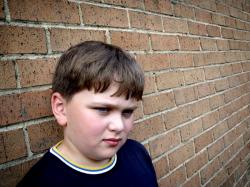Is Your Child's Teacher a Bully?

We’ve all heard about kids being bullied by peers. Kids taunt, tease, pull hair, shove and push each other on a daily basis. In recent years, schools have taken steps to stop bullying and many have a zero tolerance level for any type of peer harassment. But what if your child’s teacher is the bully? New research shows that 2% of children are bullied by a teacher sometime in their elementary or middle school years.
Most teachers are caring and compassionate. They became teachers in order to make a difference in the lives of their pupils. However, some teachers, for one reason or another, take a dislike to a child in their class and pick on them on a daily basis. Such an occurrence can have a long-lasting effect on your child’s academic experience and turn his school year into a nightmare. The effects of teacher bullying doesn’t usually end when your child leaves the teacher’s class. It’s something that can stay with him his entire life.
Student Abuse
Teachers who are bullies treat their victims much the same as a schoolyard bully. They humiliate the child in front of his classmates, abuse him verbally and make threats of physical harm or of giving low academic grades. The teacher may center your child out by “making an example” of him and insisting he stand in a corner. Possibly the teacher heaps homework on your child for “punishment” of some minor infraction. There are many different ways that a teacher can bully students.
Suffering in Silence
Chances are if your child is being bullied by a teacher he won’t say anything. Boys are more apt to suffer in silence than girls. Boys feel they should be able to “take it” and fear being teased by their peers if they tell. Your child may also fear retaliation by the teacher if he says anything about what is happening. Remember, a teacher is a figure of authority and kids think that there’s nothing that can be done if their teacher acts inappropriately.
Signs of Teacher Bullying
When a teacher bullies kids, it is a very traumatic experience for them to go through. They are embarrassed and humiliated and have no idea what steps they can or should take to stop it. They often say nothing, but there are signs that you can watch for:
Solutions
If you feel your child’s teacher may be bullying him, don’t stoop to that level. Stay calm and keep an open mind. Approach the situation in a manner that will result in a peaceful but appropriate solution.
Prevent Teacher Bullying
One way to prevent teacher bullying is to visit your child’s school often and start a relationship with your child’s teacher early in the school year. Volunteer in your child’s classroom. If you notice that your child’s teacher has a tendency to bully students, meet the challenge head-on and report the incident to the principal. Remember, a teacher’s rights end when your child’s rights, or any other child’s rights, are being infringed upon.
If you suspect a teacher at your child’s school is bullying students, step up to the plate and put an end to it immediately. You can make a difference in yours or another child’s life by teaching them that bullying of any kind or by any one is an act of cowardice and is not to be tolerated.
- How to Get the Best Supplies for Your MoneySchool supply lists can seem unending, and the price can add up very quickly. But do we really need to get everything on the list right away? When should we start looking for school supplies, such...
- Simple Math ... a Simple GiftMath affects every aspect of our lives-from balancing the checkbook to estimating the amount of sales tax at the grocery store. While we may not use Algebra regularly (and no one can convince me...
- School Violence: Can It Be StoppedIt’s a fact that violence in schools is prevalent in today’s society. We hear of school shootings, swarmings and attacks on children for their clothing, shoes and milk money. Students have been...
- Public or Private?Daniel attended private school until sixth grade, when he was diagnosed with Asperger’s Syndrome, a form of high-functioning autism. Even though Daniel set the curve in all of his classes the school...
- Middle School Homework and Study HabitsThe report cards came home and you’re disappointed with your child’s scores. You know he has the ability to do better, but aren’t sure how to get him to give his best effort. What should you...

